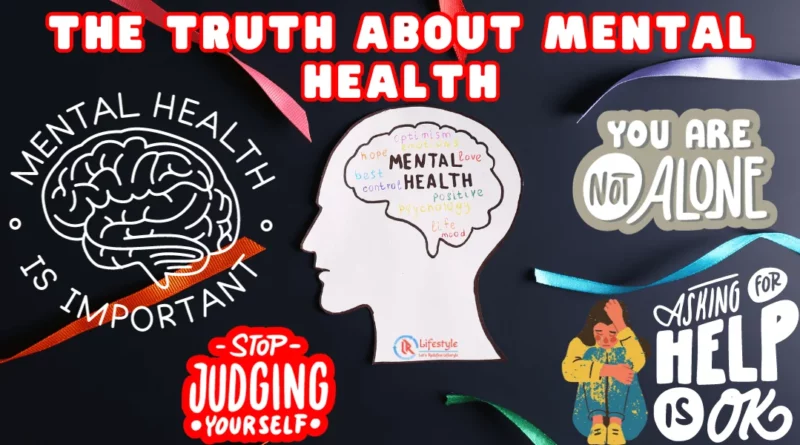The Truth About Mental Health: Debunking 15 Common Myths
Mental health is an essential aspect of our overall well-being, yet it is often surrounded by misconceptions and myths. Mental health is an intrinsic part of our well-being, affecting every facet of our lives, from personal relationships to professional growth. To promote a better understanding of mental health, it is crucial to debunk the common myths that prevent individuals from seeking help or offering support. In this article, we will shed light on 15 common myths about mental health, exploring the importance of mental health awareness, the realities of living with mental illness, the stigma surrounding mental health, and much more.
The Importance of Mental Health Awareness
Awareness is the first step to facing and overcoming challenges. It empowers individuals to understand the issue at hand, recognize its significance, and develop informed strategies to tackle it effectively. Whether it’s personal growth, societal issues, or global concerns, being aware provides the foundation for positive change and progress.
Mental health awareness plays a key role in challenging the stigmatization of mental illness. It is crucial to understand the importance of mental health which is just as important as physical health. Mental health awareness encourages conversations, promotes early intervention, and empowers individuals to seek support when needed.
The Realities of Living with Mental Illness
Living with a mental illness is not a choice nor a sign of weakness. It is a complex and challenging experience that can affect anyone regardless of age, gender, or social status. Mental illness is a real health condition that requires empathy, understanding, and appropriate treatment.
Understanding the Stigma Surrounding Mental Health
The stigma surrounding mental health contributes to the negative perceptions and discrimination faced by individuals with mental illness. People with mental illness are often misjudged by society. This stigma often stems from misunderstandings and societal biases towards the person. By challenging these misconceptions and promoting empathy and belongingness, we can create a more inclusive and supportive environment for those with mental health conditions.
The Connection Between Physical and Mental Health
Physical and mental health are interconnected; they mutually influence and affect each other. Poor physical health can contribute to the development or worsening of mental health disorders, while mental health problems can impact physical well-being. It is essential to prioritize both aspects of health for overall well-being.
The Impact of Trauma on Mental Well-being
Experiencing trauma can have a profound impact on an individual’s mental well-being. Traumatic events, such as abuse, accidents, or natural disasters, can lead to the development of mental health disorders. Understanding the connection between trauma and mental health is crucial for providing appropriate support and treatment.
The Role of Genetics in Mental Health Disorders
Genetics can play a role in the development of certain mental health disorders. While there may be a genetic predisposition, it is important to note that genetics alone do not determine mental health outcomes. Environmental factors and individual experiences also significantly influence an individual’s mental well-being.
The Relationship Between Substance Abuse and Mental Illness
There is a strong correlation between substance abuse and mental illness. Many individuals turn to substances as a way to cope with the symptoms of mental health disorders. However, substance abuse can worsen existing mental health conditions and even contribute to the development of new ones. It is essential to address both substance abuse and mental health issues concurrently for effective treatment.
Overindulgence in psychoactive substances like alcohol, prescription painkillers, or illicit drugs can result in physical, social, or emotional damage.
The Different Types of Mental Health Disorders
Mental health disorders encompass a wide range of conditions, each with its own unique set of symptoms and challenges. These include anxiety disorders, mood disorders, eating disorders, personality disorders, and many others. It is important to recognize the diverse nature of mental health disorders and approach each condition with compassion and understanding. Mental health plays an important role in your well-being. It is very important to recognize the challenges and seek proper help if you are coping with a mental illness.
Dispelling the Myth of ‘Weakness’ in Mental Health
One of the most harmful myths surrounding mental health is the misconception that seeking help or experiencing mental illness is a sign of weakness. In reality, reaching out for support shows incredible strength and resilience. It takes courage to confront one’s mental health challenges and seek necessary treatment. So if you are dealing with mental health never shy to seek help and confront your challenges or problems in front of the right person.
The Significance of Early Intervention in Mental Health
Early intervention is crucial for effectively managing mental health conditions. Recognizing the signs and symptoms and seeking help at the earliest stages can improve outcomes and prevent the worsening of symptoms. Early intervention allows individuals to develop coping strategies and access necessary support for their mental well-being.
The Role of Therapy in Managing Mental Health
Therapy is a valuable tool for managing mental health conditions. It provides individuals with a safe and non-judgmental space to explore their emotions, learn coping skills, and develop strategies for managing their mental well-being. Therapy can take various forms, including cognitive-behavioral therapy, talk therapy, and art therapy, tailored to individual needs.
Engaging in regular meditation can be a valuable coping mechanism for those facing mental health struggles. It offers a way to find inner peace, reduce stress, and cultivate a sense of mindfulness, which is beneficial for one’s overall mental well-being.
The Importance of Self-care for Mental Well-being
Self-care is an essential aspect of maintaining good mental health. Engaging in activities that promote relaxation, self-reflection, and emotional well-being can help individuals manage stress, improve their mood, and build resilience. Self-care encompasses practices such as regular exercise, adequate sleep, practicing mindfulness, and pursuing hobbies.
Exploring the Link Between Mental Health and Productivity
Mental health and productivity are deeply intertwined. A healthy mental state enhances productivity by improving focus, creativity, and problem-solving abilities. Conversely, being productive and achieving goals can positively impact mental well-being by boosting confidence and providing a sense of purpose and accomplishment. Striking a balance between the two is key to a fulfilling and successful life. Prioritizing mental well-being in the workplace through supportive environments and policies can lead to increased productivity, creativity, and overall job satisfaction. There is a clear link between mental health and productivity.
The Role of Support Systems in Mental Health Recovery
Support systems, including family, friends, and mental health professionals, play a crucial role in an individual’s mental health recovery. Having a strong support network can provide understanding, encouragement, and practical assistance during challenging times. These relationships foster a sense of belonging and hope for those on the path to recovery.
The Misconceptions Surrounding Medication for Mental Health
There are often misconceptions and stigma surrounding medication use for mental health conditions. Medication, when prescribed and monitored by a qualified healthcare professional, can be an effective treatment option. It is important to recognize that medication is not a sign of weakness or a quick fix but rather a valuable tool that can be used in conjunction with therapy and other forms of support.
The Path to Mental Health Recovery: Hope and Resilience
Recovery from mental health conditions is a unique and individual journey. It is essential to promote a message of hope and resilience to those experiencing mental illness. Recovery is possible, and with proper support, individuals can lead fulfilling lives and achieve their goals.
The path toward recovery may be challenging, but it’s certainly not impossible. As the saying goes, “Even the word ‘impossible‘ says ‘I’m possible‘.”
Conclusion
In conclusion, debunking the common myths surrounding mental health is crucial for fostering understanding, empathy, and support for individuals experiencing mental health conditions. By promoting mental health awareness, challenging stigmas, and providing necessary resources and support, we can create a more inclusive society where mental well-being is prioritized.
Let’s unite and create a future where everyone feels comfortable seeking help and support for their mental health concerns.
“Your mental health is a priority. Your happiness is essential. Your self-care is a necessity.”
Also Read:
For News related to entertainment visit our entertainment website:
https://www.glamworldtalks.com/



